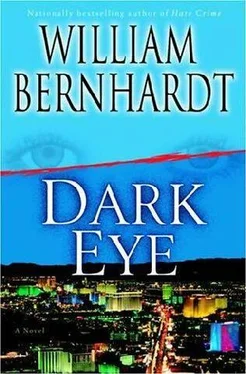“I’m kind of in a hurry, Jen. Can you give me the highlights?”
She spoke quietly, almost timidly. “Despite Patterson’s protestations, we ran the tests you requested, the progressive tox screen.”
“And?”
“A lot of time had passed on both corpses, but we found distinct traces of tetraodontoxin.”
“And that is?”
“A neurotoxin, basically. It causes paralysis, speech difficulty, shallow breathing, and slowed pulse till it gradually wears off, usually permitting brain functions and speech before it allows movement of the rest of the body.”
“Is it dangerous?”
“Given in large doses, it can be fatal.” She paused, fidgeting with her fingers. “Do you like sushi?”
“I’m more a cheeseburger and fries girl. Why?”
“Heard of fugu?”
“The blowfish that’s a Japanese delicacy, but if it’s not prepared right it can kill you?”
“That’s the one. The toxin is found in the ovaries of the blowfish, and it isn’t destroyed by cooking. Prepared properly, just enough remains to give diners a pleasantly flushed and tingly feeling. Prepared improperly, it’s fatal.”
“I think I’ll stick with Quarter Pounders. Any idea where the killer might’ve gotten this stuff? I assume it’s restricted.”
“Theft from a lab or clinic or drugstore or hospital is always a possibility. Or he might’ve gone to Haiti.”
“Haiti?”
She nodded. “I understand you can buy it on the street there. It’s used in voodoo religious rituals. That’s how they zombify plantation workers.”
“And that’s how our man keeps his victims under control. Wow. Thanks.” I grabbed my coat.
“Lieutenant?” Jennifer hadn’t budged. “We never would’ve found that if you hadn’t asked for the additional tests. How did you know?”
I smiled. “Years of experience. And training. Proper training is so important.” I grabbed the report and headed out the door. Darcy, you little genius. I’m keeping you in this investigation. Whether Granger likes it or not.
I’ve lived in this city all my life, so there was no excuse for it. If you live by only one rule in Vegas, it should be this: avoid the Spaghetti Bowl at all costs. But it would be the quickest way to get to the Colliers’ place if traffic was down…
But traffic was never down, not in the loop formed by I-35 and U.S. 93-95 around downtown Vegas, joining just to the north and west of the Old Strip. The long strands of highway gave it its culinary name, and all the locals knew traffic there could be more congested than L.A. Fortunately, I had Darcy in the car, and he entertained me by reciting the crime statistics for every violent homicide in Vegas for the last fifty years.
I left Darcy outside while I went in to meet the first victim’s mother. Mrs. Collier was remarkably informative, all things considered. It had to be unbearable, losing a daughter. I still stung from being separated from Rachel; imagine how it must feel to know your little girl was gone forever, and worse, that the psychopathic killer who snatched her did it while you were off on a holiday. The guilt would be enormous.
“She was the sweetest girl,” Mrs. Collier kept saying. She had not wanted to talk to me. She had already been quizzed extensively by Granger’s investigators. “Sweet, sweet, sweet. All my friends told me that girls were the worst. That once they were teenagers they became monsters. But not my Helen. She was always so sweet.”
“I’m sure she was,” I said, wishing the woman would come up with a more useful adjective.
“She never went in for those naughty activities some of the other girls did. She didn’t chase after boys. She didn’t stay out late. She didn’t like to party. She preferred to tap-dance.”
“Did you say tap-dance?”
“That was her grand passion. Her idol was Shirley Temple, ever since she was a baby. She could’ve been great, given her chance.”
“Was she taking lessons?”
“Yes. She and her best friend, Amber, went to Miss Claire’s School of Dance on South Fremont. Almost every Friday, they went to the dance recitals held in the basement at Trinity Episcopal.”
“Any nights other than Friday?” I asked, remembering that she was last seen on a Thursday.
“No.”
“Never?”
“Absolutely not. I had a strict policy on bedtime by ten o’clock on all the other nights of the week, but on Fridays I let her stay up till midnight. I checked to make sure she was in bed, safe, every night. And I locked the doors.”
“Could I see her room?”
After a moment of hesitation, she escorted me upstairs.
If I hadn’t known the girl was sixteen, I certainly wouldn’t have gotten it from her living quarters. It was all decked out in pink frillies and lace and flowery dust ruffles and stuff I don’t even know the names for. My parents never went in for this junk. Even at an early age it was clear I wasn’t a Barbie girl. But evidently Helen was.
Or someone thought she was.
“Had this furniture some time?” I asked the mother, who was hovering awkwardly by the door. I figured she’d probably bought it when the girl was five and couldn’t afford to replace it later.
I was wrong. “Actually, we picked this set up last year. They were having a sale at Conway Brothers.”
Hmmm. “You know, I’m probably going to be a while. I like to soak up the atmosphere, get a feel for who your daughter was. You don’t have to wait for me. I’m sure you have many other things to do.”
Couldn’t be any less subtle than that. “Very well.” She was still reluctant, but she retreated. “I’ll be in the kitchen. If you need anything.”
Thank heaven. Behaviorists don’t work well with an audience. I couldn’t get inside Helen’s head with her mother monitoring and censoring me the whole time. Helen’s desk, her closet, and for that matter her entire room, were uncommonly clean. I realize I was not the prototypical teenager, but my room had never looked like this. Had her mother cleaned up before the cops arrived? Or did Mom always keep the joint like this? Was she one of those hausfraus who scurried around telling people to take off their shoes and not touch anything, making it more like a museum than a living environment? How would young Helen react to being raised by a single parent who had that obsessive-compulsive approach to life?
I combed through Helen’s closet, finding nothing of interest. She had a lot of clothes and tons of shoes, but I supposed that wasn’t unusual for girly-girls of her age. All her outfits appeared to be of the sort her mother would approve. Tasteful knee-length tea dresses that kept the body well covered. Pep club uniform. One-piece swimsuits. No Britney Spearsish midriff-revealing outfits. No hip-hugging blue jeans. No cleavage-boosting brassieres or clinging sweaters. No Victoria’s Secret lingerie.
Maybe her idol really was Shirley Temple.
Nah.
I checked the bathroom, too, but I felt certain that if there had ever been anything of interest, Mom would’ve removed it. I not only found nothing useful, I found nothing that suggested this girl had ever hit puberty, unless you counted the box of tampons shoved to the back of the cabinet beneath the sink. No pills, no diaphragm. Not even Clearasil.
I was hoping for a diary, but no such luck. In the bottom desk drawer, however, I found a stack of collage books. Helen was a scrapbooker. But this was not your garden-variety scrapbook. There were no pictures of actors or pop stars, no Eminem or Brad Pitt. Most of the pictures came out of magazines, and all were of people in authority, people in helping professions. Police officers, doctors in white coats, firemen. Wholesome role models.
Was this girl really the Pollyanna her mom thought she was?
Читать дальше









